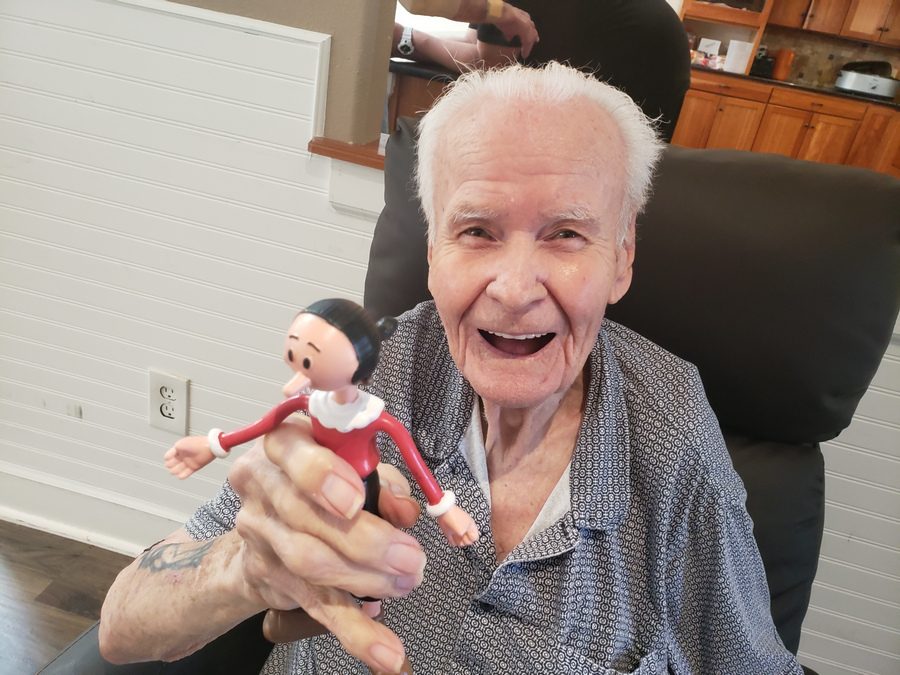All About Memory Care Providers: Why Tiny Memory Treatment Houses Are a Wonderful Selection
Memory treatment services play an important duty in sustaining individuals with Alzheimer's and mental deterioration. Little memory treatment homes stand out for their personalized approach and intimate setting. With lower staff-to-resident ratios, these homes promote more powerful connections and tailored care. Homeowners take advantage of improved social communications and a secure environment. As households explore options, understanding the distinct advantages of small memory care homes comes to be crucial. What aspects should be thought about when choosing the right home?
Understanding Memory Treatment Solutions
While numerous might know with general senior treatment choices, understanding memory care solutions is vital for families encountering the obstacles of cognitive decrease. Memory care particularly accommodates people with problems such as Alzheimer's illness and various other forms of mental deterioration. These services supply a structured atmosphere that concentrates on improving the top quality of life for residents with specialized treatment and support.Memory treatment facilities are created to guarantee security and safety and security, often featuring safeguarded environments to avoid straying. Trained personnel are readily available around the clock to help with day-to-day tasks, medication administration, and individual treatment. Additionally, memory care programs typically consist of cognitive stimulation tasks, customized to involve residents and advertise psychological wellness. Family members can gain from recognizing these solutions, as they make it possible for notified decisions regarding their enjoyed ones' care, guaranteeing that their specific needs and choices are resolved in a helpful and thoughtful manner.
The Benefits of Little Memory Care Houses
Tiny memory care homes offer distinctive advantages that can significantly improve the high quality of life for citizens with cognitive disabilities. One considerable benefit is the intimate environment, which allows for customized interactions among staff and residents. This smaller setup cultivates purposeful relationships, lowering feelings of isolation and anxiety frequently experienced by individuals with memory issues.Additionally, the reduced staff-to-resident ratio in small memory treatment homes allows caregivers to give even more mindful supervision and assistance. This method not only boosts safety and security however also promotes a complacency for the residents.Moreover, tiny memory treatment homes can adjust quickly to the one-of-a-kind requirements and preferences of each citizen, enabling for a more homelike ambience. Such an atmosphere can encourage social engagement and involvement in activities, ultimately enriching the everyday experiences of those living with cognitive problems.
Personalized Treatment Program for Locals
Personalized care plans are important in memory treatment homes, as they satisfy the unique needs and choices of each local. These strategies begin with thorough evaluations carried out by competent specialists, who evaluate cognitive capabilities, case history, and personal interests. This customized method guarantees that care is not only effective but additionally respectful of each individual's self-respect and autonomy.Moreover, customized care strategies are flexible, permitting changes as locals' demands progress gradually. This adaptability fosters a complacency and experience, which is necessary for individuals coping with memory obstacles. Caretakers are educated to implement these plans regularly, providing support that straightens with the residents' routines and preferences.Ultimately, customized care strategies boost the quality of life for residents by promoting wellness, involvement, and self-reliance, making them an essential aspect of memory treatment services in small memory care homes.
Producing a Home-Like Atmosphere
Producing a home-like atmosphere is important for fostering convenience and knowledge in memory treatment setups, as it considerably influences homeowners' psychological wellness. Tiny memory care homes commonly focus on customized touches, such as warm shade schemes, family members photos, and familiar furnishings plans, which aid residents really feel a lot more secure. Including elements similar to a conventional home, like relaxing space and common areas, motivates a feeling of belonging.Moreover, making use of all-natural light and exterior rooms can improve the environment, promoting leisure and harmony. Employee play a significant function in preserving this atmosphere by engaging with locals in a compassionate way, treating them like family members. Regular tasks, such as cooking or horticulture, can also add to a home-like feeling, offering opportunities for citizens to take part in significant experiences. Overall, creating a supporting setting sustains cognitive feature and emotional security, making it an important facet of memory care services.
Improved Social Interaction and Neighborhood
Boosted social communication and community are necessary elements of memory treatment services. By fostering individualized social involvement and producing a family-like ambience, these solutions advertise meaningful links among homeowners. Team events and activities even more urge involvement, helping people feel much more included and sustained.
Personalized Social Involvement
While social communication is important for total well-being, numerous individuals with memory problems often battle to engage meaningfully with others. Customized social involvement in memory treatment homes addresses this difficulty by developing tailored tasks that satisfy citizens' special rate of interests and capabilities. By concentrating on private preferences, caregivers can cultivate connections that reverberate deeply with everyone. Tasks such as art treatment, music sessions, and assisted conversations advertise cognitive stimulation and emotional expression. In addition, little group settings motivate camaraderie and enable more intimate interactions, improving sensations of belonging. This method not only fights sensations of seclusion yet also equips locals to keep a feeling of identity, ultimately contributing to improved psychological health and lifestyle.
Family-like Ambience
In a memory care setup, fostering a family-like environment greatly visit site boosts social communication and develops a feeling of neighborhood among homeowners. Smaller memory treatment homes typically prioritize intimate settings, allowing citizens to create closer connections with one another and team member. This nurturing environment promotes trust, which is vital for people with memory impairments. Residents are more probable to talk and share experiences, developing a helpful network that eases sensations of loneliness. The knowledge of shared rooms and routines adds to a feeling of belonging, further motivating social communication (personalized memory care). In such setups, emotional bonds thrive, resulting in enhanced general wellness and a better of life for homeowners as they navigate their daily experiences together
Group Activities and Events

Safety And Security and Protection Functions in Little Homes
Several tiny homes developed for memory treatment incorporate crucial safety and security and safety features to ensure the wellness of residents. These homes often utilize safe entry and leave indicate prevent roaming, a typical concern among people with memory impairments. Additionally, monitoring systems and alarm systems improve monitoring, making certain that team can without delay react to any unusual activities.Interior designs are tailored for security, with decreased dangers such as clutter-free pathways and sharp edges. Handrails and non-slip floor covering are generally installed to lower the risk of falls. Team member are educated in emergency procedures, ensuring they are prepared for various situations.Moreover, customized care plans may consist of analysis of specific security Look At This demands, giving tailored services for every resident. Overall, these safety and security functions develop a caring environment where homeowners can prosper while maintaining their self-respect and freedom.
Exactly how to Choose the Right Memory Care Home
How can households guarantee they pick the most ideal memory treatment home for their loved ones? The decision needs careful consideration of a number of aspects. Initially, family members ought to review the facility's staff certifications and training, making certain that caregivers are experienced in handling memory-related conditions. Next, it's essential to examine the home's setting, concentrating on security functions and whether it cultivates a feeling of area and belonging. Going to the facility can supply understanding into day-to-day activities and the social ambience, which are important for psychological excitement and emotional wellness. Furthermore, families must ask about the treatment strategies used, guaranteeing they are tailored to individual requirements. Ultimately, thinking about the home's place and access for family members brows through can add to a smoother change. By addressing these elements, family members can make an educated decision that prioritizes their enjoyed one's comfort and top quality of life in a memory care setting.
Regularly Asked Questions
What Qualifications Should Staff Members in Memory Treatment Homes Have?
Employee in memory treatment homes should have pertinent certifications, experience in dementia care, strong communication abilities, and compassion. Recurring training in behavior administration and therapeutic treatments enhances their capacity to sustain homeowners effectively.
How Do Memory Treatment Provider Differ From Standard Assisted Living?
Memory treatment solutions concentrate especially on individuals with memory impairments, providing specialized assistance and organized settings. In comparison, traditional assisted living uses basic assistance with daily tasks, doing not have the tailored technique necessary for those with cognitive difficulties.
What Sorts of Tasks Are Supplied in Memory Care Homes?
Memory care homes generally provide a selection of tasks developed to involve residents. Usual alternatives include art treatment, songs sessions, cognitive video games, workouts, horticulture, and get-togethers, all targeted at boosting well-being and cognitive feature.
Can Residents Bring Their Own Possessions to Memory Treatment Houses?
Homeowners can normally bring their very own belongings to memory care homes, enabling them to individualize their home - personalized memory care. This technique assists create an acquainted environment, promoting convenience and a sense of identification for the people

Exactly How Are Relative Involved in the Care Refine?
Member of the family play an important function in the treatment process, typically participating in decision-making, attending care conferences, and supplying emotional support. Homepage Their involvement fosters a collective atmosphere, boosting the resident's total health and lifestyle. While many may be acquainted with basic senior care alternatives, comprehending memory treatment solutions is essential for family members dealing with the obstacles of cognitive decrease. These solutions give a structured setting that concentrates on boosting the top quality of life for residents via specialized treatment and support.Memory treatment facilities are made to assure safety and security and security, typically featuring safeguarded environments to stop roaming. Personalized treatment strategies are vital in memory care homes, as they provide to the special demands and preferences of each citizen. Team participants in memory care homes must have relevant qualifications, experience in dementia treatment, strong interaction abilities, and compassion. Memory care services concentrate especially on individuals with memory disabilities, offering customized support and structured environments.